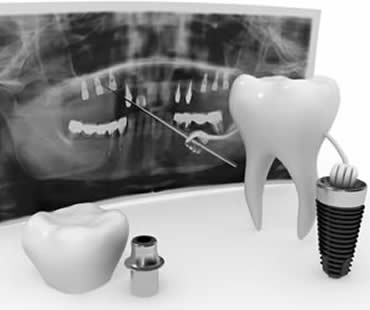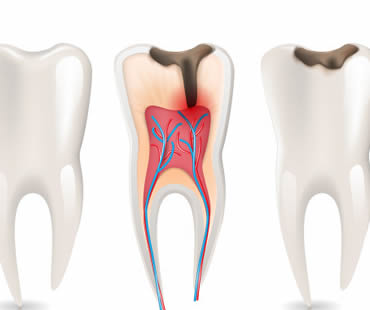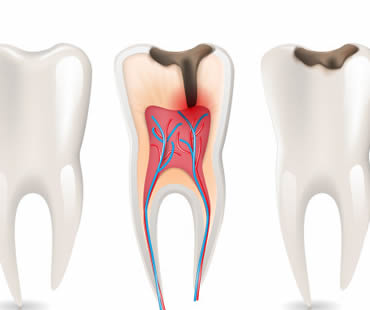
Nov 28, 2024 | Dental Topics 3, Implant Dentistry, Blog
Dental implants are the state-of-the-art restorative solution for missing teeth. They provide a stable base that is the next best thing to a natural tooth root. Because of this and other qualities, dental implants are rising in popularity each year as more and more people discover their convenience and stability.
Dental implants are replacement teeth, typically made of porcelain or a similar material, mounted on top of a titanium screw that is embedded into a patient’s jawbone. Over time, this screw will fuse directly with the bone in a process known as ossification. This fusion creates a tooth base that is so stable, it’s as good as a tooth’s natural roots.
Dental bridges can become dislodged and food may collect under the bridge, leading to discomfort and bacteria build-up. A dental implant goes all the way down, so there’s no “under” underneath to collect food and cause problems.
Most tooth restorations necessitate special ways of cleaning or flossing, and you have to be careful you’re doing all the right things to maintain your teeth properly. You care for a dental implant the same way you do for a natural tooth, by brushing and flossing, so you don’t even have to think about it when you’re cleaning your mouth.
The bones in your jaw are only healthy as long as you have healthy tooth roots in them. The tooth roots stimulate the bone, signaling it to stay full and healthy. Without the stimulation of the roots, the bone begins to shrink away. Dental implants preserve bone by acting as artificial tooth roots. The jawbone can’t tell the difference, and the bone stays strong and robust.
These factors and more are leading patients to turn to dental implants to address their missing teeth. Talk to your cosmetic dentist to see why dental implants are the perfect choice for you.
We look forward to seeing you in our Conyers dental office

Nov 12, 2021 | Dental Topics 3, Implant Dentistry, Blog
Dental implants are the state-of-the-art restorative solution for missing teeth. They provide a stable base that is the next best thing to a natural tooth root. Because of this and other qualities, dental implants are rising in popularity each year as more and more people discover their convenience and stability.
Dental implants are replacement teeth, typically made of porcelain or a similar material, mounted on top of a titanium screw that is embedded into a patient’s jawbone. Over time, this screw will fuse directly with the bone in a process known as ossification. This fusion creates a tooth base that is so stable, it’s as good as a tooth’s natural roots.
Dental bridges can become dislodged and food may collect under the bridge, leading to discomfort and bacteria build-up. A dental implant goes all the way down, so there’s no “under” underneath to collect food and cause problems.
Most tooth restorations necessitate special ways of cleaning or flossing, and you have to be careful you’re doing all the right things to maintain your teeth properly. You care for a dental implant the same way you do for a natural tooth, by brushing and flossing, so you don’t even have to think about it when you’re cleaning your mouth.
The bones in your jaw are only healthy as long as you have healthy tooth roots in them. The tooth roots stimulate the bone, signaling it to stay full and healthy. Without the stimulation of the roots, the bone begins to shrink away. Dental implants preserve bone by acting as artificial tooth roots. The jawbone can’t tell the difference, and the bone stays strong and robust.
These factors and more are leading patients to turn to dental implants to address their missing teeth. Talk to your cosmetic dentist to see why dental implants are the perfect choice for you.
Schedule your appointment at our Conyers dental office

Jun 4, 2021 | Dental Topics 3, Root Canal Treatment, Blog
Root canal therapy treats the interior of the tooth. The final step in root canal treatment is placing a permanent restoration to protect the tooth and restore it to full form and function. This procedure should be performed within one month of your root canal treatment to decrease the risk of re-contamination or breakage of the treated tooth. Having a permanent dental restoration placed will extend the success of root canal treatment by preventing damaging leakage or fracture.
The general condition of the treated tooth and the amount of tooth structure lost will determine if the tooth would be best restored with a permanent composite filling or a dental crown. For small cavities in front teeth with insignificant tooth structure loss, your dental professional may place a tooth-colored filling after a root canal procedure.
More often, your dentist will recommend the placement of a dental crown to restore a root canal treated tooth. Teeth that have had root canal therapy can be fragile, and a dental crown provides the best protection against future bacterial contamination and fracture. A dental crown is made in a laboratory and custom fit your tooth. Crowns are made of porcelain, metal, or a combination of the two. Dental crowns can be placed on front or back teeth, and are especially appropriate for molars that must withstand heavy chewing forces.
Having a root canal treated tooth restored with a dental crown or permanent filling will extend the success of your treatment. If you are showing symptoms of a damaged or diseased tooth, a properly performed root canal treatment and permanent restoration can save your tooth and extend its function for a lifetime.
We treat patients from Conyers and the surrounding area

May 15, 2025 | Dental Topics 3, Family Dentistry, Blog
It seems that with each passing year, our lives become more hectic, scheduled, and harried. If you have children, there are the endless school events and music lessons and sports practices. Running from here to there can leave you less time for some of the most important things, like your oral hygiene.
Have you found yourself putting off your regular dental check-up? Has it been more than a year since you saw your dentist? Are your children up-to-date with their dental visits, but you’re falling behind? This can happen, especially as we place the care of others over the care of ourselves.
By choosing a family dentistry practice, this can be a thing of the past when it comes to your teeth! A family dentist can see each member of your family, from the youngest infant to the oldest retiree. All of your dental visits occur in the same office, so you won’t be jumping in the car to go yet somewhere else, stuck in traffic and feeling overwhelmed.
With family dentistry, you can schedule your appointments to have multiple family members seen back-to-back or at the same time. This is especially of interest to families with multiple children. Imagine having three or four appointments going on at the same time, and being done after the time of a single visit! Reduce the time you spend in the waiting room with squirming or unhappy children by choosing a family dentistry practice.
Your family dentist realizes that your time is extremely important, and that each member of your family is important and valued. A family dentist knows about all of the changes your teeth undergo over time, and is sensitive to this. It’s easy to make smile goals with your family dentist, as he or she will be there from the start to the finish.
Make the choice to simplify your life. Make it easy to keep you and your entire family smiling brightly. Choose a family dentistry practice today.
Schedule your appointment at our Conyers dental office

Aug 13, 2021 | Dental Topics 3, Root Canal Treatment, Blog
There are many misconceptions about root canal treatment. This process is recommended when your tooth pulp is infected or damaged, and the treatment is needed to save your tooth. The damaged pulp is removed from your tooth and filled with a material that prevents future infections. A crown is often recommended to be placed over the tooth to complete the procedure and preserve the tooth. If your dentist recommends this treatment for you, it may save you some worry if you know the truth about the procedure.
Truth about the pain
Root canal treatment has advanced over the years, making it much less painful than its previous reputation. Anesthesia is used during the procedure, and most patients say it is no worse than getting a filling.
Truth about office visits
The procedure can usually be completed in just one or two office visits. Several factors impact the number of appointments, such as the extent of infection, complexity of the procedure, and need for referral to a different health care professional. Your dentist will be able to advise how many office visits are needed for your treatment.
Truth about symptoms
Your tooth does not absolutely have to be painful to indicate the need for a root canal. A dentist may diagnose a serious problem even when you don’t feel discomfort. That’s one reason regular checkups are important, so that issues can be caught.
Truth about cause
It is a myth that root canal treatment is caused by illnesses like heart disease, arthritis, or kidney disease. Medical research has proven these long-time myths to be untrue.
Truth about success
The benefits of root canal treatment can last a long time, even permanently. Sometimes patients experience broken teeth after treatment, but dentists attribute this to failure in the restoration or tooth construction instead of the root canal treatment itself. Patients who do not opt to get crowns tend to experience tooth breakage more often.
If you live in the Conyers area contact us today

Nov 18, 2022 | Dental Topics 3, Root Canal Treatment, Blog
There are many misconceptions about root canal treatment. This process is recommended when your tooth pulp is infected or damaged, and the treatment is needed to save your tooth. The damaged pulp is removed from your tooth and filled with a material that prevents future infections. A crown is often recommended to be placed over the tooth to complete the procedure and preserve the tooth. If your dentist recommends this treatment for you, it may save you some worry if you know the truth about the procedure.
Truth about the pain
Root canal treatment has advanced over the years, making it much less painful than its previous reputation. Anesthesia is used during the procedure, and most patients say it is no worse than getting a filling.
Truth about office visits
The procedure can usually be completed in just one or two office visits. Several factors impact the number of appointments, such as the extent of infection, complexity of the procedure, and need for referral to a different health care professional. Your dentist will be able to advise how many office visits are needed for your treatment.
Truth about symptoms
Your tooth does not absolutely have to be painful to indicate the need for a root canal. A dentist may diagnose a serious problem even when you don’t feel discomfort. That’s one reason regular checkups are important, so that issues can be caught.
Truth about cause
It is a myth that root canal treatment is caused by illnesses like heart disease, arthritis, or kidney disease. Medical research has proven these long-time myths to be untrue.
Truth about success
The benefits of root canal treatment can last a long time, even permanently. Sometimes patients experience broken teeth after treatment, but dentists attribute this to failure in the restoration or tooth construction instead of the root canal treatment itself. Patients who do not opt to get crowns tend to experience tooth breakage more often.
Our dental office is located in Conyers





